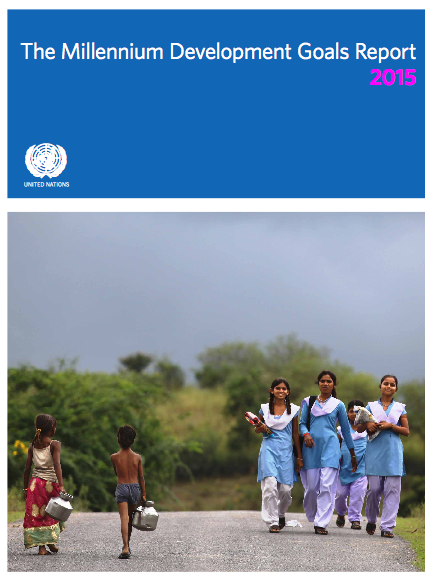Extreme poverty was ended for more than one billion people through efforts under the Millennium Development Goals (MDGs), according to the final edition of the MDGs Report.
The 2015 report highlights achievements in access to drinking water, universal primary education, child and maternal health, gender equality and eliminating hunger, among others.
However, the report also underscores the need for more work as part of the post-2015 development agenda and the proposed Sustainable Development Goals (SDGs) to ensure that the poorest and most vulnerable people are not left behind.
 6 July 2015: Extreme poverty was ended for more than one billion people through efforts under the Millennium Development Goals (MDGs), according to the final edition of the MDGs Report. The 2015 report highlights achievements in access to drinking water, universal primary education, child and maternal health, gender equality and eliminating hunger, among others. However, the report also underscores the need for more work as part of the post-2015 development agenda and the proposed Sustainable Development Goals (SDGs) to ensure that the poorest and most vulnerable people are not left behind.
6 July 2015: Extreme poverty was ended for more than one billion people through efforts under the Millennium Development Goals (MDGs), according to the final edition of the MDGs Report. The 2015 report highlights achievements in access to drinking water, universal primary education, child and maternal health, gender equality and eliminating hunger, among others. However, the report also underscores the need for more work as part of the post-2015 development agenda and the proposed Sustainable Development Goals (SDGs) to ensure that the poorest and most vulnerable people are not left behind.
The UN Department of Economic and Social Affairs (DESA) produced the annual report using data compiled by the Inter-Agency and Expert Group on MDG Indicators, which includes over 28 UN and international agencies, and is led by DESA’s Statistics Division.
This final assessment of the MDGs illustrates global and regional progress on the eight Goals over the past 15 years, and says that the MDGs “prove that goal setting can lift millions of people out of poverty, empower women and girls, improve health and well-being and provide vast new opportunities for better lives.”
Even the poorest countries can make progress with targeted interventions, sound strategies, political will and adequate resources, according to the report. Still, it highlights uneven progress across countries, regions, urban and rural areas and poor and rich households, as well as persistent inequalities, including on gender inequality. The report identifies conflict as the greatest threat to human development and the biggest obstacle in achieving the MDGs.
Climate change and environmental degradation undermine progress achieved, the report finds, noting that global carbon dioxide (CO2) emissions has increased by over 50% since 1990, an estimated 5.2 million hectares of forest were lost in 2010, and marine fish stocks are over-exploited.
The report was launched in Oslo, Norway, on 6 July 2015, in presence of UN Secretary-General Ban Ki-moon, Erna Solberg, Prime Minister of Norway, and Paul Kagame, President of Rwanda. Speaking at the launch Ban stated that “global efforts to achieve the Goals have saved millions of lives and improved conditions for millions more around the world.” He emphasized that “setting goals works – both as a guide and as a benchmark for greater accountability.” He add, however, that “we are keenly aware of where we have come up short.” He highlighted the emerging post-2015 development agenda as a “springboard” for future progress.
The report was also launched at the Ministerial Segment of the 2015 meeting of the High-Level Political Forum on Sustainable Development (HLPF). Jeffrey Sachs, Special Advisor to the UN Secretary-General, and Director, Earth Institute, Columbia University, said that “where we tried, we succeeded; where we did not try, we did not succeed,” and underscored that the MDGs brought focus to the plight of the poor.
Among the lessons of the MDGs that can inform the post-2015 development agenda, the report emphasizes data as indispensable for the development agenda. It highlights advances in monitoring and statistical capacity gained through the MDGs and underscores the importance of further improvements in data collection, disaggregated data and statistical capacity to track progress on the proposed SDGs.
The UN Economic and Social Commission for Asia and the Pacific (ESCAP), the Asian Development Bank (ADB) and the UN Development Programme (UNDP) launched the Asia-Pacific MDG Report 2014/15 in tandem with The MDG Report 2015. The regional report examines MDG achievements in the Asia-Pacific and provides a regional perspective on the post-2015 development agenda. [UN Press Release] [UNDP Press Release] [MDG Indicator and IAEG Website] [DESA Press Release] [DESA Newsletter] [Publication: The Millennium Development Goals Report 2015] [Statement of UN Secretary-General] [Progress Chart] [ESCAP Press Release] [Webcast of Launch] [IISD RS Coverage of Report Launch at HLPF]